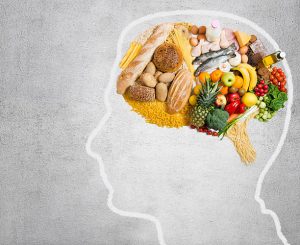Eating the right foods to keep your brain healthy can dramatically decrease your risk of developing neurological problems later in life.
When it comes to our brain health, neither we nor the therapists who work with us have much power over our genes. But unlike many other health issues, there are measures we can take to reduce our risk of developing dementia and cognitive decline as we age. To keep our bodies working at their peak capacity – and to help control a multitude of illnesses and issues – nutrition plays an integral role in brain health. Some nutrients are more beneficial than others when keeping your brain sharp. In order to get the most quantitative benefit, you need to eat the right ones in the right amounts.
We all know that the food we eat can affect our bodies. But did you know that it can affect your brain as well? There are many types of foods that can benefit the health of your brain. These foods help promotes cognitive function and mental clarity while also lowering the risk of developing neurological problems later in life. The following are some great foods to get you started!

Whole Grains
Whole grain products such as whole wheat bread, pasta, barley, brown rice, oatmeal and bulgur wheat contain vitamin E that preserves brain function and protects cells.
Whole grains are packed with nutrients and ensure your daily dose of fiber, which reduces the risk of stroke and high blood pressure.
Turmeric
Turmeric is a curry-powder spice that’s also been used medicinally for thousands of years. It’s got the unique ability to enter the brain directly and stimulate the creation of new brain cells, a process called neurogenesis. The research also connects Turmeric with improved memory, less depression, and other types of brain health.
Tea and Coffee
Coffee and tea are packed with nutrients and antioxidants, but if you’re watching your caffeine consumption choose green tea or decaf coffee.
Both green tea and coffee are loaded with antioxidants and brain-boosting compounds. Both contain caffeine, which can improve alertness, energy, and athletic performance. Green tea also contains the amino acid L-theanine which can cross the blood-brain barrier and have a relaxing and cognitively enhancing effect. In addition to being healthier than coffee, green tea has many other benefits as well.
Fruits
Certain fruits, such as oranges, bell peppers, guava, kiwi, and others contain high amounts of vitamin C. Vitamin C helps prevent brain cell damage to help keep your memory sharp. In fact, studies have found that enough vitamin C intake can prevent Alzheimer’s completely.
Pumpkin Seeds
Foods that are rich in antioxidants may support a healthy brain and lower risk of mental disorders. Pumpkin seeds, or pepitas, are a good source of antioxidant vitamins E and K, as well as minerals that your brain needs. They contain zinc, magnesium, copper, and iron; these nutrients work together to protect against mental decline. Zinc helps the nervous system signal between nerves and muscles, while magnesium helps with learning and memory. Copper helps your body use iron, which delivers oxygen and other nutrients to your brain.
Nuts
Nuts are loaded with healthy fats, vitamin E, and antioxidants, which have been found to be beneficial for both the brain and heart.
Leafy Greens
Leafy greens such as broccoli, collards, spinach, and kale contain various nutrients such as vitamin K, lutein and folate. Vitamin K helps with the formation of fat inside brain cells and has been seen to improve memory. Leafy greens are also a great source of lutein that is known to protect against oxidative stress in the aging eye. Leafy greens also contain high levels of flavonoids called anthocyanins that has been seen to improve memory and cognition.
Fatty Fish
Fish contains large amounts of omega-3 fatty acids which are important for overall health and cognition.
Consuming a diet high in omega 3 fatty acids can help you feel happier. Fats make up 60% of your brain, and a variety of fats, including omega-3s, make up the cell membranes of most cells. Omega-3s make up 50% of the membranes of your brain cells, so it’s important to get enough of them.
Eggs
Eggs are a good source of B vitamins and choline. B vitamins help to slow cognitive decline and deficiencies in B vitamins have been associated with depression and dementia. Choline is used to create the neurotransmitters responsible for mood and memory. The body needs choline to create the neurotransmitters responsible for mood and memory.
Blueberries
Blueberries are a rich source of antioxidants and other nutrients that can help improve communication between brain cells, thereby protecting your brain against aging and disease. In addition, blueberries contain compounds that have anti-inflammatory effects.
Dark chocolate
Dark chocolate has long been touted for its health benefits, including improved cholesterol and blood flow. But research now shows that it can also help improve your brain health. Dark chocolate is rich in flavonoids, which are thought to improve blood flow and lower blood pressure—both of which benefit the brain. Dark chocolate contains 4 times the fiber, iron and magnesium than milk chocolate does, as well.
Pomegranate
Pomegranates are among the healthiest and most delicious fruits. Their juice can help you maintain your overall health, lower your blood pressure and protect against diseases like cancer, Alzheimer’s and diabetes. Drinking pomegranate juice could also give you a healthy boost of energy while helping you combat first world problems like stress and fatigue.
Flax
Flax is a brain healthy food. Flax, also commonly referred to as linseed, is a seed rich in the plant-based Omega-3 fatty acid. Research suggests that flax reduces the risk of heart disease. Flax can help lower total blood cholesterol and reduce the risk of heart disease.
Avocados
Avocados are a great choice for anyone looking to improve their brain health. Avocados contain monounsaturated fats, which have been linked to many benefits, including lower blood pressure and increased cognitive function.
Avocados are nutrient-dense fruits that impart a rich, buttery taste and creamy texture to any dish. Not only do they make great guacamole and other delicious snacks, but they may even support brain health.

